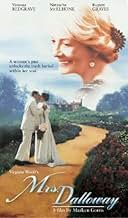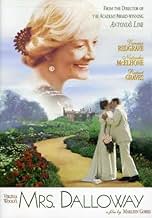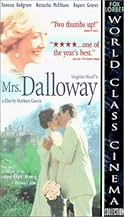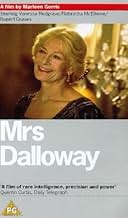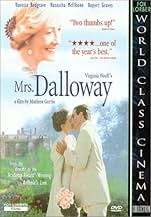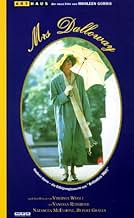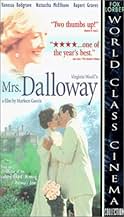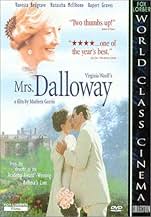Mrs Dalloway
- 1997
- Tous publics
- 1h 37m
IMDb RATING
6.5/10
4.4K
YOUR RATING
In 1923 London, socialite Clarissa Dalloway's well-planned party is overshadowed by the return of an old suitor she had known thirty-three years earlier.In 1923 London, socialite Clarissa Dalloway's well-planned party is overshadowed by the return of an old suitor she had known thirty-three years earlier.In 1923 London, socialite Clarissa Dalloway's well-planned party is overshadowed by the return of an old suitor she had known thirty-three years earlier.
- Director
- Writers
- Stars
- Awards
- 2 wins & 1 nomination total
- Director
- Writers
- All cast & crew
- Production, box office & more at IMDbPro
Featured reviews
Virginia Woolf is thought of as a high-brow rather than popular novelist yet the novel this film is based on sold well when first published in 1924. It is easy to see why there is nothing rarefied in the treatment of its themes, making choices and breaking with the past.
Clarissa Dalloway, a society matron, played with startled radiance by Vanessa Redgrave, is throwing a party and while making the arrangements she remembers back to the choice she made 30 years ago as a young woman between two men. One, Peter, charming, intelligent, adventurous, is the sort who went out and conquered India, or at least seduced the Major's wife. The other, Richard, good-looking, loving, a bit boofy, devoid of flair, is the sort that gravitates into politics. Naturally, the young Clarissa (played by Natasha Mc Elhone) has chosen the safe one, but Peter, after a chequered career, has turned up in London and pays her a call. She invites him to the party. Parallel to Clarisa's reminiscences is the story of Septimus (Rupert Graves) a returned soldier from World War I, whose wartime experiences are eating into his sanity.
Clarisa is put up as a `modern woman' who refuses Peter's love because she sees it as all demanding and all consuming, despite his attractive personality. Yet she accepts Richard, who wants and needs a dutiful, supportive wife. She also passes up the possibility of love with her close friend Sally. Though shaken when she hears of Stephen's fate from his psychiatrist, a guest at the party, and touched when she meets her old lovers again, she sees her life as going on before, safe and unexciting.
For a film-maker the amount of interior musing generated by Woolf's `stream of consciousness' writing technique presents a challenge and here Marleen Gorris has effectively used flashback to externalise Clarisa's memories. We get two stories artfully intercut, though there is not much tension in either of them - costumes, but not much drama. One does, however, get the feel of how it might have been to be in the upper class during the Edwardian late summer; as if just being there was enough (we even meet the Prime Minister at the party). Woolf and Gorris have evoked the atmosphere precisely, even if, as Lytton Strachey said, there isn't much of a plot. Even the minor characters sparkle. Robert Hardy as Sewell's psychiatist exudes bonhomie and guile, and Margaret Tyzak as the meddlesome Lady Bruton gives us a fine example of the old-fashioned female power broker at work. Overall, the film is rather slow, especially at the start, and I did wonder whether it would have been made without all the government and foundation money listed in the credits, but the quality of the performances redeem it to some extent.
Clarissa Dalloway, a society matron, played with startled radiance by Vanessa Redgrave, is throwing a party and while making the arrangements she remembers back to the choice she made 30 years ago as a young woman between two men. One, Peter, charming, intelligent, adventurous, is the sort who went out and conquered India, or at least seduced the Major's wife. The other, Richard, good-looking, loving, a bit boofy, devoid of flair, is the sort that gravitates into politics. Naturally, the young Clarissa (played by Natasha Mc Elhone) has chosen the safe one, but Peter, after a chequered career, has turned up in London and pays her a call. She invites him to the party. Parallel to Clarisa's reminiscences is the story of Septimus (Rupert Graves) a returned soldier from World War I, whose wartime experiences are eating into his sanity.
Clarisa is put up as a `modern woman' who refuses Peter's love because she sees it as all demanding and all consuming, despite his attractive personality. Yet she accepts Richard, who wants and needs a dutiful, supportive wife. She also passes up the possibility of love with her close friend Sally. Though shaken when she hears of Stephen's fate from his psychiatrist, a guest at the party, and touched when she meets her old lovers again, she sees her life as going on before, safe and unexciting.
For a film-maker the amount of interior musing generated by Woolf's `stream of consciousness' writing technique presents a challenge and here Marleen Gorris has effectively used flashback to externalise Clarisa's memories. We get two stories artfully intercut, though there is not much tension in either of them - costumes, but not much drama. One does, however, get the feel of how it might have been to be in the upper class during the Edwardian late summer; as if just being there was enough (we even meet the Prime Minister at the party). Woolf and Gorris have evoked the atmosphere precisely, even if, as Lytton Strachey said, there isn't much of a plot. Even the minor characters sparkle. Robert Hardy as Sewell's psychiatist exudes bonhomie and guile, and Margaret Tyzak as the meddlesome Lady Bruton gives us a fine example of the old-fashioned female power broker at work. Overall, the film is rather slow, especially at the start, and I did wonder whether it would have been made without all the government and foundation money listed in the credits, but the quality of the performances redeem it to some extent.
I enjoyed this movie very much, although I really loved the novel a bit more, but that's always the case it seems. Vanessa Redgrave and Natasha McElhone make a GREAT older/younger version of each other, and Rupert Graves gives a stellar performance as a young man dealing with the impact of war. This is a gently told tale, but it's done very well. Worth a look.
I doubt that any film version of "Mrs Dalloway" can convey the breadth, depth, complexity, and radical vision of Virginia Woolf's novel. Although Gorris's version of it does seem to surpass typical expectations--and can stand on its own right as a rare adult character study movie, it still lacks Woolf's punch when it comes to dealing with her raw reality, her human presences, and her attacks on the bloodless psychiatric profession. Gorris is mainstream saddled, but more critically, she's limited by images that cannot take the measure of either the experimental content or more committed thoughts which only written forms can account for. For instance, there are more generics in the movie version, more single note characters and situations. And while Clarissa Dalloway and Septimus Warren Smith are the exclusive possessors of embodied consciousness and memory in the movie, this is hardly the case with the book.
I guess to comprehend what's going on (not easy because the movie's past--a simultaneous time period, seems a bit arbitrary, and character physical mismatches are not helpful) it's important to know that Woolf herself led something of a double life. Socially, she tended to hover on the surface as more of a performer or entertainer--and thus the "snob" epithet that is oft hurled her way; but privately she was, of course, the deeply conscious writer and thinker plagued with recurring mental illness, attempted suicides, and marriage upheavals which were so critical to the self she understood to be both real and dark.
Woolf wrote "Mrs Dalloway" as perhaps both an escape from her more tormented self and from the fashion of post-war disillusionment. Indeed, Mrs. Dalloway, the vibrant, party-loving social mediator, who Woolf herself, if not for certain life turns, could have become, initially stood alone in Woolf's novel. But this sunny version could not be tolerated. For Woolf, the writer, knew and understood too much of reality, too much of the war's devastation, too much of the underclass, and too much of the ice cold world of psychiatry, to let the party woman Clarissa's vibrancy take hold. Septimus Warren Smith was introduced to the novel not only as her counter figure, but also as a crucial part of Mrs Dalloway's consciousness without which she would be too glib, too shallow, too lacking in a sense of self.
One telling example of how the movie cannot handle the novel's radicalism is its take on Septimus Warren Smith's guilt. Gorris offers Smith's hallucinogenic encounters with Evans, which are both gripping and melodramatic, as the obvious causation (shell-shock) of his mental breakdown. But in Woolf's text what's more at stake for Smith is his emotional abandonment of his Italian wife, Rezia. Septimus, his war traumas not withstanding, exerts his own form of trauma onto his wife. It's this act of dehumanization, more personal than war, in which he shuts down communication with and discards his only ally, that drives his guilt. This is not a false self-blame, but a true self -blame, and a true guilt. But that such disengagement is socially acceptable and thus totally outside the narrow scope of his acquisitive, neurosis-classifiers psychiatrists, who deny any bitter complexities, only compounds his madness. So, Septimus' productive guilt, which should be most amenable to treatment, gets stifled by a power-based professional elite. And who understood this perverse, anti-human corps of experts better than Virginia Woolf, the writer, and author of the novel "Mrs. Dalloway," who was also thought to be lacking in proportion, and unable to adjust.
I guess to comprehend what's going on (not easy because the movie's past--a simultaneous time period, seems a bit arbitrary, and character physical mismatches are not helpful) it's important to know that Woolf herself led something of a double life. Socially, she tended to hover on the surface as more of a performer or entertainer--and thus the "snob" epithet that is oft hurled her way; but privately she was, of course, the deeply conscious writer and thinker plagued with recurring mental illness, attempted suicides, and marriage upheavals which were so critical to the self she understood to be both real and dark.
Woolf wrote "Mrs Dalloway" as perhaps both an escape from her more tormented self and from the fashion of post-war disillusionment. Indeed, Mrs. Dalloway, the vibrant, party-loving social mediator, who Woolf herself, if not for certain life turns, could have become, initially stood alone in Woolf's novel. But this sunny version could not be tolerated. For Woolf, the writer, knew and understood too much of reality, too much of the war's devastation, too much of the underclass, and too much of the ice cold world of psychiatry, to let the party woman Clarissa's vibrancy take hold. Septimus Warren Smith was introduced to the novel not only as her counter figure, but also as a crucial part of Mrs Dalloway's consciousness without which she would be too glib, too shallow, too lacking in a sense of self.
One telling example of how the movie cannot handle the novel's radicalism is its take on Septimus Warren Smith's guilt. Gorris offers Smith's hallucinogenic encounters with Evans, which are both gripping and melodramatic, as the obvious causation (shell-shock) of his mental breakdown. But in Woolf's text what's more at stake for Smith is his emotional abandonment of his Italian wife, Rezia. Septimus, his war traumas not withstanding, exerts his own form of trauma onto his wife. It's this act of dehumanization, more personal than war, in which he shuts down communication with and discards his only ally, that drives his guilt. This is not a false self-blame, but a true self -blame, and a true guilt. But that such disengagement is socially acceptable and thus totally outside the narrow scope of his acquisitive, neurosis-classifiers psychiatrists, who deny any bitter complexities, only compounds his madness. So, Septimus' productive guilt, which should be most amenable to treatment, gets stifled by a power-based professional elite. And who understood this perverse, anti-human corps of experts better than Virginia Woolf, the writer, and author of the novel "Mrs. Dalloway," who was also thought to be lacking in proportion, and unable to adjust.
10anelson1
Everyone doesn't like everything, so I'm not surprised that some people find the movie of Mrs. Dalloway boring. They probably would find the book boring too. But it's depressing. So they won't agree with some of us who see the novel as one of the great works of the 20th century, and the film as a truly remarkable and beautiful capturing of it. The only touch I regretted was the opening of the film with the Septimus Warren-Smith war scenes. The opening really belongs with Mrs. D. and her first words, "I will buy the flowers myself." After that moment, it's a quiet day but a beautiful and sensitive one.
Kudos go to all who participated in making this wonderful film. Vanessa Redgrave, as usual, is perfect as an aging dowager who settled for the "safe" path in life instead of seeking adventure and taking risks. When her old flame reappears, she reevaluates her choices and second-guesses the paths that she chose. The film also has a sub-plot about a shell-shocked World War I veteran who is in emotional torment and is inconsolable. The film works on two levels. It shows the interaction between proper British people who speak politely to one another, but the viewer senses that there are fierce and passionate undercurrents and important thoughts that seems to be unspoken. In addition, the film is a clear indictment of the stuffy and snobby British society of Post World War I England, in which a party could be of such importance that a person's reputation could hinge on its success. There is also a feminist slant in the movie. Can a woman who spends her time at home making parties and pleasing her husband ever feel fulfilled? Did Mrs. Dalloway make the right decision in "playing it safe" in life? That is up to the viewer to decide. Meanwhile, revel in the fabulous nuanced performances, the witty dialogue and the beautiful cinematography. This film is a triumph.
Did you know
- TriviaFirst screenplay written by Eileen Atkins.
- GoofsIn the flashback scenes with the younger actors, Peter is slightly taller than Clarissa. When they dance together at the party, he is considerably shorter than her.
- Quotes
Peter Walsh: [Talking about Clarissa in 1923] She broke my heart, and you can't love like that twice.
- SoundtracksTime for Old Time
Composed by Jack Trombey (as J. Trombey)
- How long is Mrs Dalloway?Powered by Alexa
Details
- Release date
- Countries of origin
- Language
- Also known as
- Virginia Woolf's Mrs Dalloway
- Filming locations
- Duke of York Column, St James's, London, England, UK(Mrs Dalloway coming back from shopping flowers)
- Production companies
- See more company credits at IMDbPro
Box office
- Gross US & Canada
- $3,309,421
- Opening weekend US & Canada
- $90,127
- Feb 22, 1998
- Gross worldwide
- $3,309,421
- Runtime1 hour 37 minutes
- Color
- Sound mix
- Aspect ratio
- 1.85 : 1
Contribute to this page
Suggest an edit or add missing content



